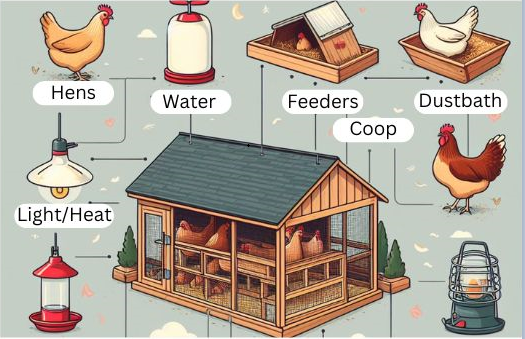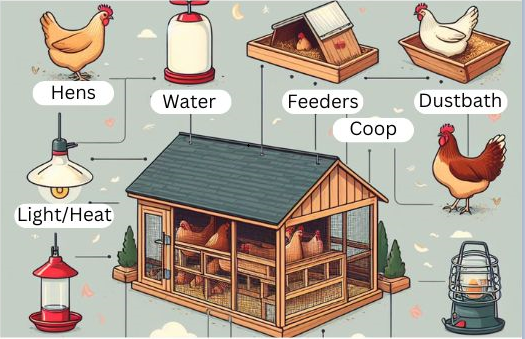
I’m often struck by the growing number of people who choose to keep chickens. Is it possible that people are becoming interested in personal sustainability instead of letting grocery stores and vending machines rule their lives? I doubt it, but one can hope.
Chicken keeping can be deeply rewarding, offering a unique combination of benefits that range from the practicality of food production to the joy of connecting with nature. Add a vegetable garden into the mix, and your meals will be flavored with pride of accomplishment and sprinkled with healthfulness.
However, as with any pet care, keeping chickens involves responsibility. These creatures rely on their keepers for survival, comfort, and health. I want to stress that proper chicken care requires more than just providing shelter; it involves essential supplies and a commitment to ongoing welfare.
Surely, when keeping chickens, you’re taking on a commitment that extends beyond setting up a coop and scattering some feed. Just as a builder needs the right tools to construct a solid home, you’ll need specific equipment to ensure your flock thrives.
I want to discuss fundamental supplies every chicken keeper should have. I’ll cover everything from the coop to the bedding, food, and health supplies.
Of course, we can discuss incubators, brooders, and other chick supplies in another article. My focus here is on adult chickens.
With the right preparation, your feathered friends will not only survive but flourish under your care. Let’s move on and explore the core element of your chicken’s home: the coop.
Chicken Comfort Essentials – Coops, Runs, and Bedding
Raising chickens goes beyond having fresh eggs every morning. Work is involved, but if you love what you are doing, it’s not work, right?
Your chickens need a suitable home where they can thrive. The chicken coop is the cornerstone of their habitat, fortress against predators and the elements.
The size and style of the coop will depend on your flock size and space.
Many owners prefer traditional wooden coops, but mobile versions allow pasture rotation. Make sure any coop you choose is sturdy, easy to clean, and large enough for the chickens you intend to keep.
Next, let’s talk about the run.
This is the enclosed outdoor space where your chickens can peck and roam during the day. A spacious, secure run is essential for their physical health and mental well-being.
It should be equipped with predator-proof fencing and have enough space for your chickens to express their natural behaviors, such as foraging and dust bathing. Also, consider the placement of the run; access to natural sunlight and shade is vital.
The right bedding material is crucial. It will keep your chickens comfortable and make cleaning the coop easier. Pine shavings are popular for their absorbency and odor control, but you may also consider straw or sand, depending on your climate and the coop design.
Whatever bedding you use needs to be changed regularly to prevent waste buildup and control pests and odors.
Lastly, don’t forget that air quality matters, just as in any home. Good ventilation helps remove dampness, ammonia, and other harmful gases. It also helps keep your chickens cool during hot spells. However, avoiding direct drafts on your birds, especially during the colder months, would be best. Get this balance right, and you’ll have set the stage for a healthy, comfortable flock.
Flock Feeding- Nutrition, Feeders, and Waterers
Chickens require a balanced diet to stay healthy and productive. I’ll take you through the essentials of feeding your flock appropriately.
Getting nutrition right is critical to their growth, egg production, and overall health.
An appropriate diet for chickens typically includes grains, proteins, vitamins, and minerals. Commercially available chicken feed, formulated to meet these needs, usually does the trick. But depending on your chickens’ life stage, you might also consider adding supplements to ensure they’re getting everything necessary for optimal health.
Selecting the right feeder is just as important as the food itself. A feeder that protects food from weather and waste is invaluable.
Consider the size of your flock when picking a feeder: Large groups may benefit from a trough-style feeder, while a hanging feeder can save space and discourage spillage.
A reliable waterer is indispensable in addition to a feeder. Chickens need constant access to clean water, especially in hot weather or when they’re laying eggs.
There are a few types of waterers to choose from: nipple waterers help keep water clean and free from debris, while traditional water troughs require more frequent cleaning but are easy to use.
Always ensure the water is fresh. Stagnant or dirty water can harbor bacteria and lead to health issues among your birds. Regular cleaning and refilling water containers are non-negotiable tasks in responsible chicken care. To this end, a sturdy two-gallon bucket has become one of my best friends.
Did you know that water weighs 8.34 pounds per gallon? Let’s do some math. Two gallons equals 16.68 pounds. Five gallons is almost 42 pounds! I’m much happier carrying the lesser poundage from feeder to feeder, and at 6’1″, 218 lbs, I’m not a small fella. Plus, it’s much easier to pour from a smaller bucket.
Health and Happiness: Grit, Dust Baths, and Enrichment
Like other pets, chickens need attention to their health and happiness to thrive in the backyard coop. An often-overlooked essential is GRIT. It’s crucial for their digestion, as chickens have no teeth and rely on grit to help break down food in their gizzards.
A consistent supply can prevent a myriad of digestive issues. If your flock free-ranges, this is unnecessary, but grit is a good idea if they seldom get to scratch and peck out yonder. Put the grit in a separate feeder so they can take what they need when needed.
Next, I cannot overstate the importance of dust baths. Chickens naturally bathe in dust to maintain their feather health and prevent parasites. Make sure to provide a shallow area sheltered from rain filled with a mix of sand and ash.
Enrichment remains vital for your chickens to avoid stress and boredom. This can include hanging cabbages for pecking, providing perches for roosting, or scatter feeding to encourage foraging behavior.
I keep a freezer bag on the back of my sink to store eggshells. Smashed eggshells are a good source of calcium for hens and help harden the shells of fresh eggs. There are few things less pleasant than reaching into a nesting box and grabbing a handful of goo that was supposed to be an egg.
As we wrap up, remember that chicken keeping is filled with rewarding experiences that hinge on the HEALTH and WELL-BEING of your flock. The joy these birds bring when their needs are met is immense.
With the essentials covered in this guide, you’re ready to ensure your chickens not only survive but flourish with vibrancy and vigor. Happy chicken keeping!
If you have any questions, please leave them in the comments below, and I will get back to you as soon as possible!
Dave

Chickenmethod.com

